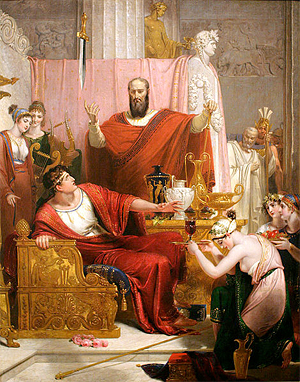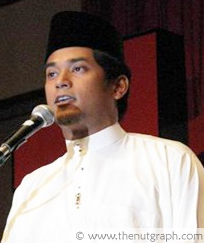
IN the interest of media freedom, Umno Youth chief Khairy Jamaluddin recently stepped up to the plate in Parliament by calling for the abolishment of the Printing Presses and Publications Act (PPPA). Khairy advocated the setting up of a national media council and for the media to be allowed to self-regulate without government interference.
The PPPA has hung, like the sword of Damocles, over editors and news organisations for more than 25 years. It has been a powerful tool in controlling the media as newspapers require annual permits to continue publishing. The Home Minister’s granting of a permit is at his or her “absolute discretion” and the decision cannot be challenged in court. Further, the minister can also choose to revoke or suspend a newspaper’s permit at any time and need not give any reasons for doing so.
Would Khairy’s proposal work? It’s not a new idea but it has never gained ground due to the government’s reluctance to abolish the PPPA. But if, and that’s a huge if, the government ever does do away with the draconian law, how would a media council work? What would it do? And what elements would need to be in place for it to function effectively and instil public confidence amongst an increasingly distrustful public?
How it works
We can get an idea of how media councils work by looking at models elsewhere for example, the UK Press Complaints Commission (PCC) and the Minnesota News Council.
Media councils generally perform two crucial roles. They hold the media accountable and they promote press freedom.
In its first role, councils generally receive public complaints on media content. They can act as a mediator, for instance, by encouraging a newspaper to publish an appropriately-worded apology to a complainant’s satisfaction. They also hold public hearings that have the power to censure the media and find them guilty of breaching an agreed ethical code. Such censures must then be published or broadcast prominently within the offending media. This method has been used to reported success in many jurisdictions, and can in fact, result in greater fairness and public satisfaction than if parties were to become embroiled in a legal suit.
Secondly, and perhaps even more importantly, media councils are also tasked with promoting press freedom and ethical standards through public education and dialogue. The Minnesota News Council, for example, believes that “interaction between the public and the news media demystifies journalistic practices, creates mutual understanding and promotes trust.”
The media’s number one priority, after all, is to act in the public interest. It is therefore fitting that a media organisation exists to pro-actively engage and receive constant feedback from the public it is meant to serve.
Voluntary vs mandatory
But can the media be trusted to regulate itself? Would self-regulation result in an irresponsible media, with no one but itself to rein it in? Experience in other jurisdictions in fact, indicate that self-regulation more effectively raises standards than statutory controls. After all, it is usually the case that the things we choose to do voluntarily are performed quicker and better than when actions are forced upon us.
Journalists would also be better suited to focusing on ethics than politicians. Truth, fairness and accuracy should be foremost in any media council’s mind, and not whether a particular political party received sufficient positive coverage.
Instances such as the traditional media’s biased reporting of the Sibu and Hulu Selangor by-elections, for instance, could be potential targets for censure. So could some newspapers which demonise the lesbian, gay, bisexual and transgender community, and the questionable practices of their reporters in obtaining information for their stories.
So would it work? Can Malaysia put in place a media council which would improve standards and regain public trust? Yes, it could, provided the following steps are taken.
Step one: Abolish all repressive laws

This is absolutely imperative. The PPPA and its partners-in-crime, the Sedition Act, Official Secrets Act and Internal Security Act have to be abolished before a media council can be set up. Their junior partner, the Communications and Multimedia Act, will also need amending to ensure that loosely defined offences, such as what it means to “annoy”, cannot be misused to threaten or harass media outfits.
This would demonstrate good faith on the government’s part in respecting freedom of expression. It would also demonstrate commitment to making the media council truly independent and self-regulating.
Moreover, if the government was still able to constantly look over editors’ shoulders, this could effectively suppress any voluntary spirit of self-regulation and discipline. After all, would anyone bother to patrol their own neighbourhoods if the army was parked at the entrance?
Step two: Independent commissioners
It would be absolutely counter-productive if the government appointed the media council’s members or commissioners. Malaysia has enough examples of supposedly independent commissions which did not live up to their promise due to a lack of independence and transparency in the appointments process.
To cite a few examples: The Malaysian Anti-Corruption Commission (MACC), Judicial Appointments Commission (JAC) and the Malaysian Human Rights Commission (Suhakam).
The government has to understand that for a commission to be independent, the appointments process has to be free from its interference. Appointments must also have security of tenure except in serious cases of proven misconduct. Indeed, there cannot be any arbitrary threat of government removal. In the UK, the PCC is funded by the media industry itself, making it financially, as well as politically, independent.
Step three: Committed editors
Media councils only work when editors are committed to making them work. Without enforcement powers, councils usually cannot compel any media to publish or broadcast a censure should the media refuse to do so.
In countries with established councils however, this rarely poses a problem due to strong editorial commitment to upholding standards. According to PCC’s website, as editors themselves develop the code of practice by which they are judged, there is therefore greater impetus to abide by and defend it. Employers even build the code into employment contracts to demonstrate its seriousness, thereby putting journalists’ jobs at risk if they break it.
Step four: An informed public
With steps one to three and an active media council in place, the result should be a better informed public, able to tell when the media have not been fair or accurate. Because it is up to the public to monitor the media and complain when errors are made, public education and awareness is equally crucial in making a media council work.

The way forward
So, can we do it? Can we make all this happen?
Well, as the saying goes, you’ll never know until you try. So kudos to the Rembau Member of Parliament for raising this issue when he had the opportunity to do so, no matter his political motivations.
It’s certainly something worth supporting, if we hope to see our media practising by ethical, instead of political, standards. ![]()
Ding Jo-Ann thinks Datuk Joseph Salang Gandum is unclear on the concept of a media council. The information, communication and culture deputy minister said in Parliament that a media council can help monitor the alternative media. At the same time, he evaded the question about whether the government would abolish repressive laws.
Read previous Holding Court columns
[related-posts]
The Nut Graph needs your support


Anonymous Coward says
Well, this certainly sounds interesting. Hopefully the PPPA gets abolished and we can get honest, unbiased reporting from all sides.
Mode says
Wow! That’s a huge step in the right direction, if (huge if) it happens.
Never thought I’d say this, but kudos to KJ.
HANI says
Ms. Ding has raised excellent points for the positives of a self-regulating industry, but I feel that she has not sufficiently addressed the negative attributes to a self-regulating industry.
As such, I’d like to highlight that the underlying reason for the financial crisis of 2009 was the fact that the US SEC trusted the financial industry to self-regulate, and it has been found to be a resounding disaster that impacted the entire world. Now, even “sophisticated” and institutional investors are demanding that government regulators increase their regulatory powers over the financial industry.
Admittedly, I doubt that our media are on par with the NYSE brokers for crookedness. Among honest [persons], self-regulation is good. However, not all [persons] are honest, and the “watchers” need watching too, at least for transparency’s sake. Because when an independent commission is appointed solely from the industry it is meant to regulate, they’ll regulate the industry for their own benefit first and foremost, and the general public could suffer for it.
I’m all for freedom of speech, but I’m not all for freedom from regulation. That’s anarchy.